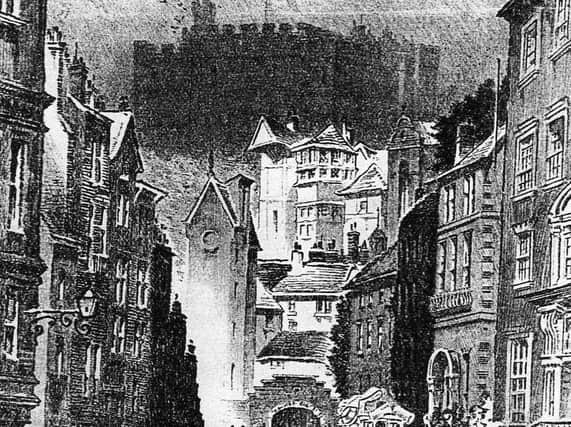Three crooks hanged outside the gates at Lancaster Castle


In mid-February 1806 Christopher Simpson, aged 23, was up before the Preston magistrates accused of assaulting and robbing Stephen Sparrow on the King’s highway, in the township of Claughton.
After considering the evidence the chairman Samuel Horrocks, the MP for Preston, ordered him to be sent to Lancaster Castle to await his trial for highway robbery.
Advertisement
Hide AdAdvertisement
Hide AdAlready being held at Lancaster was Mary Jackson, aged 20, who had at the October 1805 Assizes been cleared of the murder of Ann Smith of Manchester, but been held in custody awaiting trial for felony. Jackson had come to the attention of Preston folk in June 1805 when a gentleman living on the outskirts of town had employed her as a dairy maid.
She had stayed in his employment about a week when he had cause to visit the Preston market. When he returned she had absconded having robbed the house of linen, wearing apparel, silver tea spoons and about £5 in cash. On being missed she was pursued and overtaken at Haslingden where she delivered up the whole of the articles she had stolen, and she was, from mistaken leniency, allowed to go away.
However, justice was soon to overtake her for on the Sunday morning following she was apprehended in Church Street, Manchester being suspected of the murder of Ann Smith. A bill board had been offering £30 reward for her apprehension. When arrested, she had in her possession a bundle, containing silk gowns and other articles of female wearing apparel, of considerable value, which she was strongly suspected of stealing at Bolton, from where she had just arrived. A pawnbroker’s ticket was also found upon her, which was for a watch that had belonged to Ann Smith.
At her Assizes trial the evidence against Mary Jackson seemed strong, but she implicated a man named as James Cheetham who, she claimed, had given her the articles belonging to the deceased found in her possession. The doubts led to the jury finding her not guilty of murder and subsequently indictments were brought against her for stealing property belonging to Ann Smith and to theft from Bolton and remanded in custody.
Advertisement
Hide AdAdvertisement
Hide AdBoth Simpson and Jackson stood on trial at the Assizes in March 1806 before Sir Giles Rooke and both were found guilty as charged. His Lordship sentencing both of them to be executed. In the days that followed both made voluntary confessions of their crime with the hope of salvation when they were despatched into eternity.
Mary Jackson confessed to not only the crime of stealing but admitted murdering Ann Smith and declared that her previous allegations against James Cheetham were untrue.
Simpson who had retained a certain amount of mystery about him revealed that he had escaped from gaol in Hereford, whilst under sentence of death for stealing, prior to arriving in Lancashire and committing the robbery he was convicted for. He also stated that he had in his time broken open fifty houses, to have stolen over thirty horses, and to have committed more highway robberies than his memory could recall.
Along with a man named James Foxcroft from Manchester convicted of burglary the pair were hanged outside Lancaster Castle on the third Saturday of April 1806. A large crowd gathered in the neighbourhood to watch the grim spectacle unfold as the wretched culprits shared the gallows.